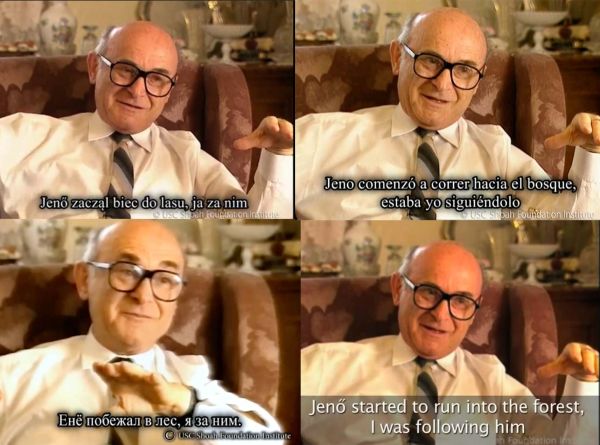László Kiss, Twin Who Survived Auschwitz, Played Key Role in Hungarian Holocaust Education
USC Shoah Foundation mourns the loss of László Kiss, a survivor of Auschwitz who played an integral role in USC Shoah Foundation’s educational efforts in Hungary. László died January 25 at the age of 94 in Budapest, where he has lived since after the World War II.
Kiss, a chemistry professor who valued his privacy, did not speak about his wartime experiences until he agreed to record an interview with USC Shoah Foundation in 1999. The resulting testimony became a centerpiece of Holocaust education in Hungary, with hundreds of teachers—in Hungary and around the world—exploring the nature of testimony through clips of his recollections. In 2010, when the Institute held its first teacher training in Hungary—which utilized his testimony—Kiss decided he would begin to speak in public about his experiences, and continued to do so until his passing.
László Kiss was born in Seregélyes, Hungary, in 1928. László, his twin brother, Endre (Bandi), and their older sister, Ágnes, were raised in a Jewish family with a strong sense of Hungarian identity. László attended primary school in his hometown; however, due to anti-Jewish restrictions, he was unable to continue his studies at the town’s high school. In 1943, he moved to Budapest, where he enrolled in the “Jewish class” at Berzsenyi Dániel High School. His twin brother stayed behind to learn a trade.
After Germany invaded Hungary in March 1944, László was able to get back to his family, despite travel restrictions on Jews. The family was forcibly relocated to the ghetto in Seregélyes. László’s father and his father’s twin brother were soon transported to a slave labor camp in Austria, where both died. In June 1944, the entire Jewish population of Seregélyes was deported to Auschwitz-Birkenau. Immediately upon their arrival, László and Bandi were separated from their mother and sister and forced to submit to Dr. Josef Mengele’s notorious studies of twins.
In January of 1945, as Soviet troops were advancing towards Auschwitz-Birkenau, László and Bandi were sent on a death march. The twins tried to escape from mass execution in the forest, but Bandi was shot and killed in the failed attempt. László was able to hide with a friend until Soviet troops liberated the area.
László was the only member of his immediate family to survive the war. He returned home and an uncle urged him to write down what he had been through. Those memories, recorded right after he returned home, were eventually published under the title Auschwitz Diary in 1999—the first time he showed the work to anyone.
László moved to Budapest and became a professor of chemistry at Eötvös Loránd University.
He and his wife had a son and a daughter.
Andrea Szonyi, USC Shoah Foundation’s Head of Programs for International Education, tried repeatedly to enlist László to speak publicly over the years, but he always declined. Then, as she led a teacher training in 2010, she spotted László.
“I was way into the presentation at the training when I noticed the door opening at the back of the room and László and his wife quietly sat down in the last row,” Szonyi said. “Some time later he called me and explained that he decided he had to talk. He felt that there are so few witnesses alive that it is his obligation to educate. From then on, he took every opportunity to attend lectures, book presentations, and talks. He would sit quietly in the back and after the main program he would raise his hand signaling he had something to add.”
As a scientist, László was very concerned with the accuracy of his recollections.
His testimony has been subtitled in multiple languages for use in classrooms around the world and was among the first used in Hungarian schools.

More than 1,000 teachers in Hungary have used IWitness, USC Shoah Foundation’s educational platform. Seventy activities and 83 curated clips organized into topics are offered in Hungarian, featured on a dedicated page for Hungarian users.
Over the past decade more than 150 teachers in Hungary have participated in “Teaching with Testimony,” a weeklong workshop accredited by the Hungarian Ministry of Education where teachers create their own lessons built around testimony from the Visual History Archive. These teachers will now engage other educators through the recently launched Network of Educators Teaching with Testimony in Hungary.
László is survived by his wife, Katalin Kiss; two children, Júlia and András; and four grandchildren.